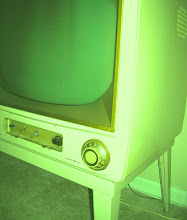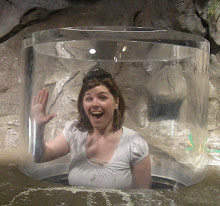
Welcome to the first edition of The Best (or Worst) of British Television, starting with the series Lost in Austen, which recently aired on ITV here in the UK. This column is the beginning of a semi-regular look of the happenings of British television. I will cover both series currently airing and plan to delve into the annals of British TV (covering such gems as The Office and Coupling, amongst others). There might even be a guest columnist or two on this topic. Before I begin it may be helpful to point out a few differences between British TV v. American TV. The major one being that unlike in American TV, most seasons of television that air across the pond usually consist of, at most, 13 episodes. They also tend to have less seasons, with the exception of the soap-style dramas, which go air each night and go on forever, just like our soaps. These two facts lead to tighter stories than perhaps happens in American television. Another fun fact is that the Brits call their seasons, series, such as Series One of Lost rather than Season One of Lost.
"I'm having a truly post-modern moment."-Lost in Austen
Lost in Austen is the tale of a modern-day London-ite, Amanda Price, (who lives in Hammersmith, where I work!) who is in love with the novel Pride and Prejudice. She is suffering at a job she doesn't like, and stuck in an unfulfilling relationship. She escapes into her tattered copy of Pride and Prejudice, and loves the fictional Mark Darcy. Her boring life changes in a big way when Elizabeth Bennet shows up in her bathroom. Yes, you read that correctly, her bathroom. As is true with fantasy/sci-fi dramas, one must just accept the premise without questioning too much, because otherwise one may get bogged down in reality.
What follows are four episodes that grow increasingly stronger in the story telling. I must admit that after the first episode I was a bit skeptical of where the story was heading. There was something a little contrived in how Amanda just happened to be reading Pride and Prejudice when this story began. [Again, though, for the purposes of storytelling, it necessarily has to be this way.] Nearly everything that happened in that first episode was fairly predictable (would you be surprised if I told you the boys of the novel were falling in love with the wrong people? I suspect not.), and had many classic "fish out of water" scenes. The one where Amanda curses and smokes when a lady of that time does not and one where she tries to figure out how to brush her teeth. One of the best moments in the whole series however, is when a certain scene from a very famous Pride and Prejudice movie is recreated. I won't spoil it for you, but if you want a clue read Bridget Jones's Diary.
The show began to shine when it moved away from what we "know" from the books and fleshed out the characters into real people. To wit: we all know the creepiness that is Mr. Collins, but we didn't know he had three equally as creepy brothers! Or, if you are familiar with the novel (and really that is who this series is made for), you know all about the dishonorable character of Mr. Wickham. But Lost in Austen manages to make Mr. Wickham more real and nuanced, and we learn there may be more to Mr. Wickham; I would even bet that the audience might even like him. Mr. Bingley and Mr. Darcy do not disappoint either. It is quite fun to see more of these characters and even though Amanda admits that Jane Austen must be turning in her grave at some of the things happenings, but I hope Jane would enjoy these versions of her characters.
A show based on such a loved and read novel is most likely always going to be inherently predictable, and admittedly, Lost in Austen in the end is predictable. To its credit, I was not entirely sure how it was going to end. While the ending may not be surprising, the writers had at least laid out a few different options, so it did not seem completely obvious. I do feel the ending was perhaps a little bit rushed and while things are pretty much tied up, I would have like a little bit more. Still, I quite enjoyed the series despite some of the inevitability in it, and definitely recommend watching it.
I won't give away the ending, because I suspect it may show up on BBC America sometime soon. If you don't want to wait, start here, and I trust you can figure out what to do after that. After you watch it let me know what you think and if you agree of disagree with my assessment of it.



No comments:
Post a Comment